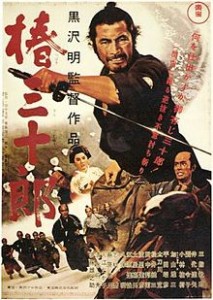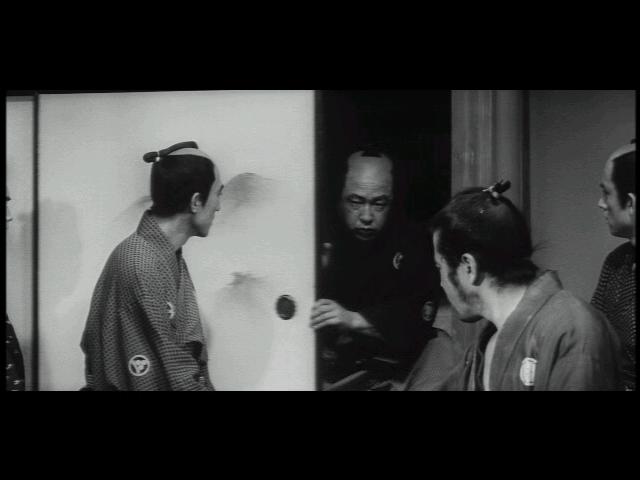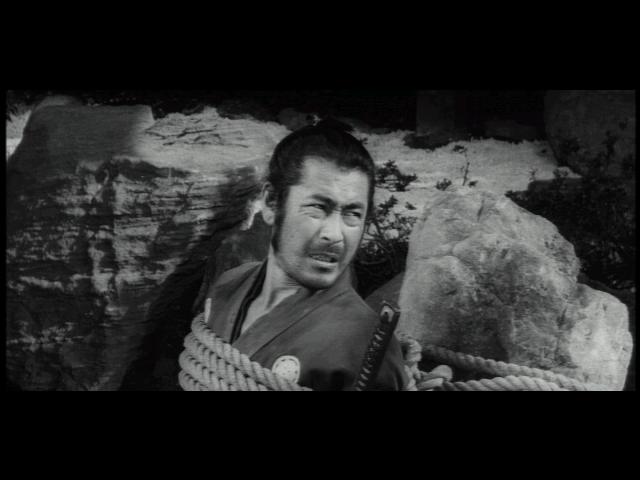“Killing people is a bad habit.”
|

Synopsis:
An older samurai (Toshiro Mifune) assists a group of naive young clansmen in rescuing a kidnapped political official.
|
|
Genres, Themes, Actors, and Directors:
- Akira Kurosawa Films
- Japanese Films
- Kidnapping
- Political Corruption
- Samurai
Response to Peary’s Review:
As Peary notes, Kurosawa’s follow-up to Yojimbo (1961) isn’t quite as masterful or well-known as its predecessor (he argues it’s “not as ambitious… or as impressively photographed”), but still has much to recommend it. It’s “much funnier” and less cynical in its approach, and contains at least two valuable lessons: that violence should be avoided when possible, and that strength and cunning can come in unexpected packages. Mifune — portraying a “hero who does care about those who need help and is affected emotionally by what transpires around him” — is as compelling as always; he conveys more worldly wisdom in his right pinky than most other movie actors combined.
Redeeming Qualities and Moments:
- Beautiful imagery

- Plenty of unexpected humor (including Keiju Kobayashi as the captured spy who hides in the closet but pops out every now and then to express his opinion)

- Toshiro Mifune’s powerful yet subtly comedic performance

Must See?
Yes. While not traditionally ranked among the top of Kurosawa’s oeuvre, it’s nonetheless critical viewing for any true film fanatic.
Categories
Links:
|
One thought on “Sanjuro (1962)”
A very definite must! One to check back with from time to time, for equal if not advanced enjoyment.
This is simply ONE DAMN GOOD MOVIE! (It’s been a while since seeing ‘Yojimbo’, so I can’t readily compare at the moment, but…)~there are those who do not hold this with Kurosawa’s finest (can’t agree there) and those who have particular affection for it because it finds the director in rare territory: comedy. Granted, it’s comedy firmly and seriously placed in the real world of the samurai and, as well, the film’s overall emphasis is not on comedy. Nevertheless, it’s comedy, Kurosawa-style, and very welcome indeed.
The comic seed is planted in the first scene – in which we are simply thrown into a room where a bunch of samurai men are having a conversation and making a plan. Halfway-through, Mifune enters in an appropriately jarring manner, tells them their plan is wrong and why it is wrong. He then spends the rest of the movie telling them they’re wrong about just about everything they think up, and why they are wrong. Therein lies most of the comedy and it’s a treat.
Of course, the actual power-struggle plot is the stuff of period drama. Yet, it’s a marvel how deftly Kurosawa blends elements as he makes his way through one of his few real popcorn movies. (‘The Hidden Fortress’ is probably another.)
Mifune is nothing short of genius here and you basically don’t want to take your eyes off him. A fave sequence of mine comes late in the film: a kind of montage, in which Mifune is trying to catch up on his sleep but is repeatedly interrupted by people opening and closing doors. His reactions are priceless. But I could mention countless scenes in which Mifune commands – basically, anytime the camera is on him, really. He is so at home in this film!
Special mention: Takako Irie and Reiko Dan as the mother and daughter who end up playing straight men to the antics of Mifune and his samurai ‘students’. Playing very refined women, their timing is impeccable for leisurely comic effect. (It’s very interesting seeing Dan playing what could be considered a thankless role – which it isn’t, really, when you compare this with her polar-opposite work two years prior in ‘When a Woman Ascends the Stairs’.)
Another real plus: the score by Masaru Sato. The film has no real theme music. What it does have is a splendid richness, as the score repeatedly shifts to serve the film’s specific needs at any given time. Powerful.
This is one top-notch flick! I was genuinely thrilled while watching it again: one of those occasions that revived this film fanatic’s occasionally jaded soul.